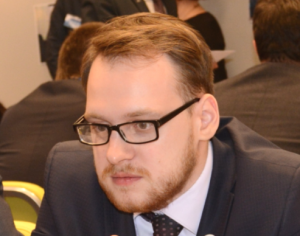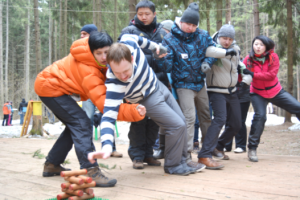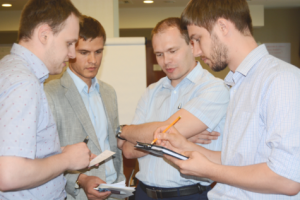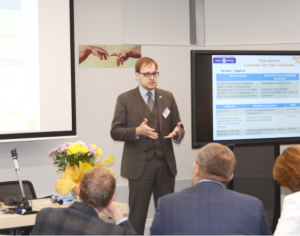“Now it’s Our Turn to Meet Expectations!”
This digest issue starts out a series of articles about first enrolment graduates of the management reserve training program. The second training year will match the intensity of the first one: “future leaders” will have to perform their individual tasks, work with tutors, have personal coaching sessions, etc. Have they benefited from the training? Have their careers changed? These are the questions we ask the graduates.
Our first interviewee is Fedor Novikov, general director deputy on pharmaceutical transportation, ABC.
– Fedor, is there anything that has changed for you after your participation in the training program?
– Last August I was promoted to the position of the general director deputy on pharmaceutical transportation and I totally plunged into this project. Participation in the program has provided me with necessary tools and has strengthened my inner motivation.
– Did you have any expectations of the training program? Were they met?
– First of all, this was high quality training focused on management, with 90% devoted to on-the-job training. 10% was what we got from experts, our executives, who’d mastered their skills not in theory, but in practice. So, I’d wanted to learn from their experience so as to be able to perform tasks related to the company strategic objectives. Training allowed us to verify our assumptions with the company vision, and also to get support and necessary tools from the top management to fulfill these tasks. Now it’s my turn to meet their expectations.
– Could you share the impressions of your first training year?
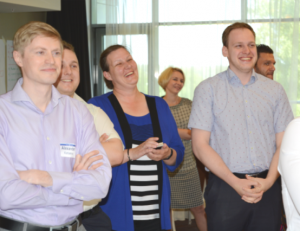 – The atmosphere was really comfortable. Most of the relationships were born in teambuilding activities. I am still in touch with my program-mates on most of the tasks I do. For me it was very important to study project management, its foundations and tools. Every transportation is a micro project. Aviation transportation, including regular flights, has also a project-like character. On “Project Fair” I tried on some projects, and that was “Industry Knowledge Center” project that I got interest in. It was useful to interact with lots of colleagues in the company. I learned what they were up to, their job issues – that is knowledge I use now to work more efficiently.
– The atmosphere was really comfortable. Most of the relationships were born in teambuilding activities. I am still in touch with my program-mates on most of the tasks I do. For me it was very important to study project management, its foundations and tools. Every transportation is a micro project. Aviation transportation, including regular flights, has also a project-like character. On “Project Fair” I tried on some projects, and that was “Industry Knowledge Center” project that I got interest in. It was useful to interact with lots of colleagues in the company. I learned what they were up to, their job issues – that is knowledge I use now to work more efficiently.
– Is there anything else you remember in the four training modules?
– A lot. But I would like to emphasize two practical things:
1) In one of the first seminars we had the GE representatives. The focus of their presentation was brought on mistakes people make: All people make mistakes. If not, then they don’t do anything. But the most important thing is to overtake your competitives in making mistakes. What is worse than making mistakes is not admitting them, as the problem stays unsolved. So, the faster we are in admitting mistakes, the faster we can deal with problems.
2) There were two events devoted to information transfer and the way it might be changed and interpreted going from person to person. Sometimes a customer discusses a task with a project manager, the project manager interprets it to project team members, they explain it to their subordinates, so as a result the task formulation 3 or 4 times goes through the prism of vision of different project participants and can be misinterpreted. So, now we are trying to reduce the number of chain links to lose minimum of information. This can be done by special IT platforms which keep all the participants together. Another way to avoid misinterpretation of tasks is involving in projects senior executives, so they could sound their expectations for the project team members.
– What is your interpretation of a leader?
– If a person can perform tasks within prescribed terms and limits, then he is a good manager. Going beyond the given framework, looking for creative solutions, motivating people for a non-standard approach, leading them to the goal realization, ability to show by your own example that there is nothing impossible – this is what I call a leader. Leadership is more about motivation, when people trust the person and follow him/her.
– What can you recommend to the second enrolment program participants? How to become a leader?
– First of all, they should take up ambitious challenging tasks, be ready not just to combine them with job responsibilities, but to plunge into them totally taking all possible risks. The second important thing is their readiness to learn more. You just can’t do without it. It’s impossible to know everything, so ongoing training is a must. Thirdly, they have to be ready for co-operation. There are no ideal people. It’s important to admit your weaknesses, be able to complement yourself and your job with the colleagues and tools, build up a team ideal for task performance. And at last, they have to have responsibility for the decisions made, resources and people to reach the goals together. This is not just about sharing power; this is about being fully in charge.
 Настройки
Настройки
